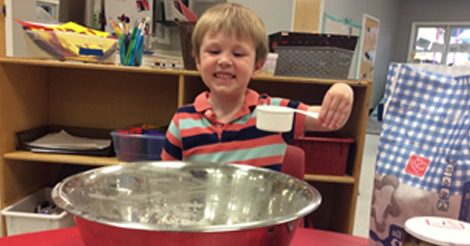Conduct Cooking Experiments with Assistance
 This month we are exploring the concept of cooking as a science and sensory experiment! By exploring ingredients, the smell and flavors produced when mixing them, as well as molding and kneading components such as dough, we are incorporating rich experiences in science, fine motor skills, and sensory play. Cooking activities also build self-esteem and freedom of expression when your child wields their own cooking tools and experiments freely with the measurement of ingredients. Cooking experiments also opens doors to deeper conversation where critical thinking skills will develop, as well as the development of diversity and multi-cultural practices when discussing recipes and foods from around the world. This activity can be conducted by your child solo, or one-on-one with you, a teacher, or a peer.
This month we are exploring the concept of cooking as a science and sensory experiment! By exploring ingredients, the smell and flavors produced when mixing them, as well as molding and kneading components such as dough, we are incorporating rich experiences in science, fine motor skills, and sensory play. Cooking activities also build self-esteem and freedom of expression when your child wields their own cooking tools and experiments freely with the measurement of ingredients. Cooking experiments also opens doors to deeper conversation where critical thinking skills will develop, as well as the development of diversity and multi-cultural practices when discussing recipes and foods from around the world. This activity can be conducted by your child solo, or one-on-one with you, a teacher, or a peer.
Age-appropriate Adaptations:
- Two-year-olds—Your child can explore the ingredients you use when cooking dinner. Encourage your child to smell, taste, and mix ingredients together to help you bake or cook. Consider giving your child a variety of tools and ingredients to experiment with on their own, served in containers with lids for easy clean up. Cleanliness practices can also be incorporated in your lessons, teaching proper hand-washing procedures before and after touching food. In addition to a hands-on experience, recipe books with photos can be shared as a visual prop to enhance and extend conversational skills.
- Three-year-olds—In addition to having your child help you prepare meals in the kitchen, you can assist your child in following a recipe read from a recipe book, or a recipe passed down through out the generations in your family. In addition to science, mathematics, and sensory development, this will create opportunity to converse about the diversity in your family and family traditions. Your child’s critical thinking skills and preferences will sharpen as he or she contemplates their specific food preferences, how they may differ from yours, and food trends across your family’s generations.
- Four-/Five-year-olds—A trip to the local grocery store, produce store, or bakery is a great way to continue to enhance and extend learning domains. Your child will love the sensory experience of smelling and seeing all of the goodies these stores have to offer, and your child can assist you in choosing items that he or she may want to taste or cook with at home. Encourage your child to push out of their comfort zone and try new foods! When at home, mixing and measuring ingredients will enhance mathematics, sensory, and science skills. Incorporating a short video or book about foods from various worldly cultures will give your child a broader understanding of food practices around the world, and how food impacts society dynamics. In-depth conversations about the pictures they view, the foods they taste, and the cultural backgrounds of these foods will enhance language skills, critical thinking, and will introduce multi-cultural and diversity concepts.
Skills Supported: Language development, critical thinking, science, sensory, mathematics, diverse and multi-cultural understanding, familial practices, and an opportunity for a close bonding experience with your child.
